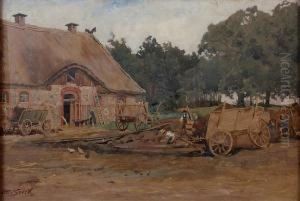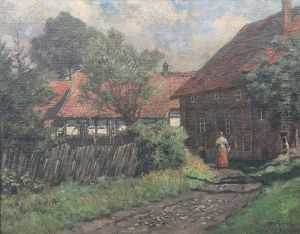Otto Seeck Paintings
Otto Seeck was a distinguished German historian, not an artist, renowned for his contributions to the study of ancient history, particularly the history of the Roman Empire. Born on February 2, 1850, in Riga, which was then part of the Russian Empire and is now the capital of Latvia, Seeck came from a family that valued education and intellectual pursuits. His academic journey led him to study at some of the most prestigious universities in Germany, including the University of Dorpat (now Tartu in Estonia) and the University of Göttingen, where he honed his expertise in classical philology and ancient history.
Seeck's scholarly career was marked by his deep exploration into the decline of the ancient world, a subject on which he authored several influential works. His magnum opus, 'Geschichte des Untergangs der antiken Welt' (History of the Decline of the Ancient World), published in six volumes from 1895 to 1920, remains a seminal work in the field of late antiquity and the transition from the ancient to the medieval world. This work, alongside his other publications, showcased his belief in meticulous research and critical analysis of primary sources, which earned him a reputation as a rigorous historian.
Throughout his career, Seeck also made significant contributions to understanding the administrative and social structures of the Roman Empire. His work on the Notitia Dignitatum, an ancient document detailing the civil and military offices of the empire, is particularly noteworthy. By painstakingly reconstructing the text, he provided invaluable insights into the late Roman administrative system and its bureaucracy.
Otto Seeck's academic contributions were recognized by his contemporaries, and he held professorships at several German universities, including Münster and Greifswald. Despite his focus on the past, Seeck's work has had a lasting impact on the study of history, influencing not only his immediate successors but also modern scholars interested in the complexities of ancient civilizations and their decline. He passed away on October 29, 1921, in Münster, Germany, leaving behind a legacy of scholarly rigor and a body of work that continues to be referenced in the study of ancient history.










